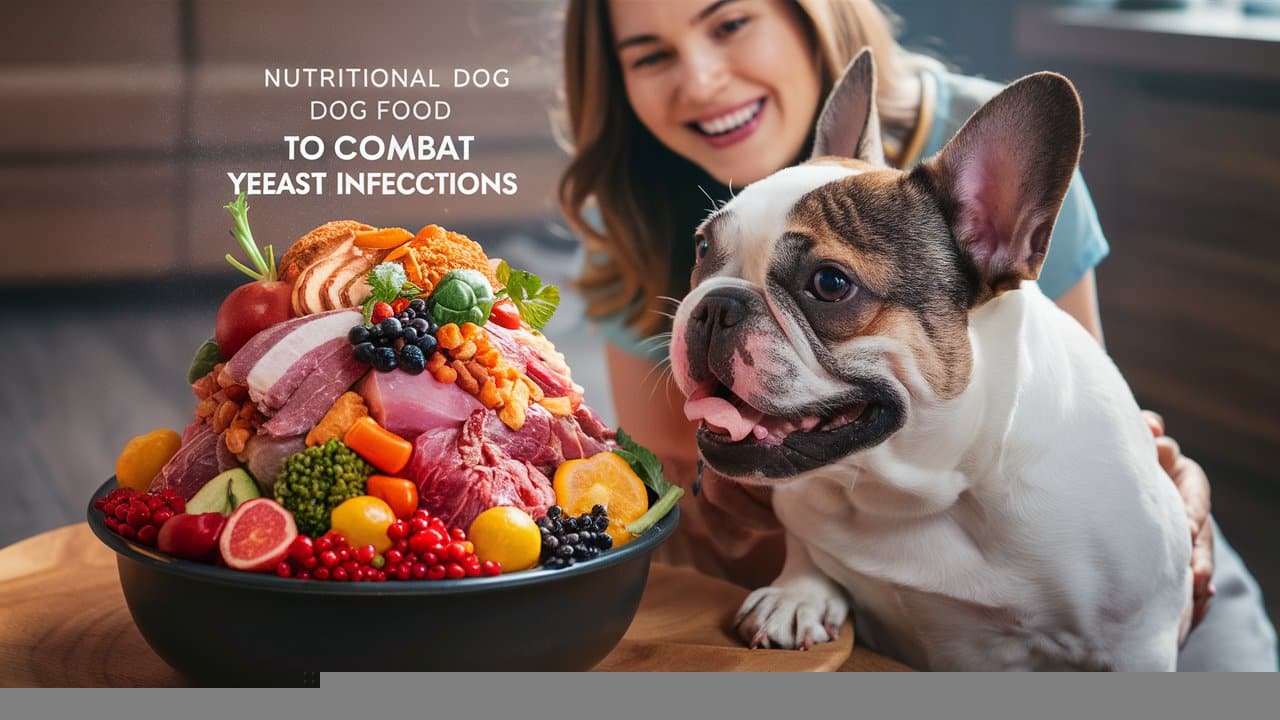Best dog food for yeast infections
While food alone won’t cure the infection, incorporating the right nutrients can support your dog’s gut health and aid in fighting off yeast overgrowth. From high-quality proteins like fish and poultry to beneficial omega-3 fatty acids found in fish oil, making informed dietary choices can make a significant difference.

Read on to discover the best dog food options for yeast infections and help your pup find relief from the irritating symptoms.
Key Takeaways:
- Balance is Key: A balanced diet rich in high-quality protein sources like fish, poultry, or lamb can promote healthy gut environment and may help prevent yeast overgrowth.
- Healthy Fats Matter: Including omega-3 fatty acids found in fish oil or flaxseed can reduce inflammation and support healthy skin for dogs with yeast infections.
- Consider Probiotics: Probiotics, beneficial bacteria that support gut health, can help maintain a balanced gut microbiome and indirectly aid in preventing yeast overgrowth for dogs suffering from yeast infections.
Understanding Yeast Infections in Dogs
What is a yeast infection?
An itchy, red skin could be a sign of a yeast infection in dogs. Yeast, a naturally occurring fungus, can overgrow on the skin and in the gut, leading to discomfort for our pets. This overgrowth can cause issues like ear infections, recurrent skin infections, and hair loss.
Causes and triggers of yeast overgrowth
On top of the list is allergies, a weakened immune system, or even certain medications triggering yeast overgrowth in dogs. For instance, an imbalanced gut microbiome can play a significant role in the development of yeast infections.
Common symptoms of yeast infections in dogs
Dogs suffering from yeast infections may display symptoms like itchy, red skin on the paws, ears, and belly. Another indicator could be recurrent skin infections and even hair loss. These symptoms can be distressing for your furry companion and may require attention to alleviate their discomfort.
The Role of Diet in Yeast Infections
Yeast infection, or yeast dermatitis, is very common in dogs. What causes a yeast infection in a dog, what are the symptoms to look out for, and how are yeast infections in dogs treated?
https://www.vets4pets.com
How diet can support treatment
Treatment for yeast infections in dogs goes beyond just medication. A balanced diet can support your furry friend’s overall treatment plan. While food alone won’t cure the infection, it can help create a better internal environment for your dog’s body to fight it off.
Importance of gut health in preventing yeast overgrowth
Treatment for yeast infections is key, and gut health plays a crucial role in preventing yeast overgrowth. A balanced diet rich in high-quality proteins, healthy fats, and probiotics can help maintain a balanced gut microbiome and indirectly prevent yeast overgrowth.
The key to preventing yeast infections lies in understanding the importance of gut health. By feeding your dog a diet that promotes a healthy gut environment, you can help support their overall health and well-being.
This means choosing foods rich in high-quality proteins, healthy fats, and probiotics to maintain a balanced gut microbiome.
Key nutrients for a healthy gut environment
Infections can be a real drag for our furry friends, but there are ways to help. Concerning yeast infections, key nutrients play a crucial role in creating a healthy gut environment. Foods rich in high-quality proteins, healthy fats, and probiotics can all contribute to supporting a balanced gut microbiome and preventing yeast overgrowth.
Understanding the importance of key nutrients for a healthy gut environment can make a significant difference in your dog’s overall health. By choosing the right foods to support gut health, you can help your furry friend find relief from yeast infections and get back to feeling their happy, playful selves.
Nutritional Requirements for Yeast Infection Relief

High-quality protein sources for easy digestion
To support your dog’s digestive health during a yeast infection, include high-quality protein sources in their diet. Opt for proteins like fish, poultry, or lamb, as these are easier for your furry friend to digest.
These protein sources can reduce the likelihood of triggering allergies and promote overall gut health. Incorporating these into your dog’s meals can help create a better internal environment for their body to combat yeast overgrowth.
Healthy fats for inflammation reduction and skin health
The addition of healthy fats, such as omega-3 fatty acids found in fish oil or flaxseed, can aid in reducing inflammation and maintaining healthy skin for your dog. These fats play a crucial role in supporting skin health and can indirectly contribute to alleviating the discomfort caused by yeast infections.
By incorporating these fats into your dog’s diet, you are providing necessary nutrients that promote overall well-being.
Plus, a diet rich in omega-3 fatty acids can also help in reducing the chances of inflammation, which is vital for skin health. With respect to combating yeast infections, ensuring your dog’s skin is healthy and properly nourished is key. These healthy fats can work wonders in supporting your furry friend’s skin health and overall comfort during this challenging time.
Probiotics for a balanced gut microbiome
Introducing probiotics into your dog’s diet can aid in maintaining a balanced gut microbiome, which can help prevent yeast overgrowth. Look for dog foods that contain beneficial bacteria to support your furry friend’s digestive health.
Probiotics promote a healthy gut environment, which indirectly contributes to easing the symptoms of yeast infections. By including probiotics in your dog’s diet, you are taking a proactive step towards supporting their overall gut health and well-being.
Easy and effective, probiotics can play a crucial role in maintaining a balanced gut microbiome, necessary for preventing yeast overgrowth in dogs. By incorporating probiotics into your dog’s diet, you are equipping their digestive system with the necessary support to combat yeast infections and ensure their overall health is well-maintained.
Limiting simple carbohydrates to prevent yeast growth
With a focus on limiting simple carbohydrates like sugars and refined grains in your dog’s diet, you can help prevent fluctuations in blood sugar levels that may contribute to yeast problems. By avoiding these types of carbohydrates, you are creating a more stable internal environment for your dog’s body to combat yeast overgrowth.
Working towards a balanced diet that limits simple carbohydrates is a proactive step in supporting your furry friend’s overall health and well-being.
With an emphasis on maintaining a balanced diet that limits simple carbohydrates, you are taking a significant step towards preventing yeast overgrowth and ensuring your dog’s well-being. By being mindful of the types of carbohydrates in your dog’s diet, you can create a more stable environment conducive to combating yeast infections effectively.
Choosing the Right Dog Food for Yeast Infections

Look for dog foods with beneficial bacteria and probiotics
For a dog suffering from yeast infections, it’s vital to look for dog foods containing beneficial bacteria and probiotics. These live bacteria can help maintain a balanced gut microbiome, indirectly preventing yeast overgrowth. Opt for a diet rich in high-quality protein sources like fish, poultry, or lamb, along with healthy fats like omega-3 fatty acids found in fish oil or flaxseed.
Consider limited ingredient diets for suspected allergies
Infections, consider a limited ingredient diet if allergies are suspected to be a contributing factor. These diets can help reduce the likelihood of triggering allergic reactions that may worsen yeast infections.
Limited ingredient diets provide a simpler but still nutritious option for dogs with sensitivities. Speak to your vet about choosing the best limited ingredient dog food for your furry friend.
Avoid dog foods with added sugars and refined grains
Yeast infections can be exacerbated by dog foods containing added sugars and refined grains. These ingredients can cause fluctuations in blood sugar levels, potentially contributing to yeast problems. Opt for dog foods that are free from these additives to create a more stable internal environment for your dog’s body to combat yeast overgrowth.
Working with Your Veterinarian
Importance of proper diagnosis and treatments
Keep in mind that consulting your veterinarian is crucial when dealing with your dog’s yeast infection. A proper diagnosis is important to understand the underlying cause of the issue. Your veterinarian will recommend appropriate treatment and advise on any dietary changes that could be beneficial. Trust their expertise and guidance to ensure your furry friend gets the care they need.
How dietary changes can support veterinary care
An important aspect of supporting your dog’s veterinary care is through dietary adjustments. By providing a balanced diet with high-quality protein sources, healthy fats, and probiotics, you can create a better internal environment for your dog’s body to fight off the yeast infection. These dietary changes may indirectly help prevent yeast overgrowth and promote overall gut health.
With proper care and a supportive diet, you can help your dog find relief from yeast infections and get back to feeling their happy, playful selves. Keep in mind, working hand in hand with your veterinarian is key to ensuring the best outcome for your furry companion.
In addition to dietary changes, your veterinarian may recommend medicated shampoos or other topical treatments to help manage the infection. By following their guidance and implementing necessary treatments, you can effectively support your dog’s journey to recovery.
Additional Tips for Managing Yeast Infections
Once again, when dealing with a yeast infection in your furry friend, there are a few extra steps you can take to help manage the situation. After consulting with your vet and making dietary adjustments, consider environmental changes to reduce yeast growth, explore topical treatments and medicated shampoos, and regularly monitor your dog’s progress.
Environmental changes to reduce yeast growth
With yeast infections, it’s crucial to create an environment that is unfriendly to those microbes. Consider reducing moisture in your dog’s living spaces, as yeast thrives in damp environments. Regularly clean your dog’s bedding and any areas they frequent and be mindful of potential allergens that could exacerbate the issue.
Topical treatments and medicated shampoos
Environmental changes can only go so far in managing yeast infections. Pertaining to topical treatments and medicated shampoos, they play a crucial role in combating the infection directly. These products can help soothe your dog’s irritated skin, reduce inflammation, and fight off the overgrowth of yeast.
Monitoring progress and adjusting care plans
One of the most critical aspects of managing your dog’s yeast infection is monitoring their progress and adjusting care plans as needed. Regularly assess your dog’s symptoms and behaviors to see how they are responding to treatment.
By implementing these additional tips alongside dietary adjustments and vet-recommended treatments, you can help your furry friend find relief from yeast infections and get back to their happy, healthy selves.
Do not forget, every dog is unique, so what works for one may not work for another. Take the time to tailor your approach to your dog’s specific needs and situation to ensure the best possible outcome.
Summing up
With this in mind, finding the best dog food for yeast infections can be a game-changer for your furry friend’s comfort. Opt for a balanced diet rich in high-quality proteins, healthy fats, and probiotics to promote a healthy gut environment and indirectly combat yeast overgrowth.
FAQ
What should I look for in the best dog food for yeast infections?
When choosing the best dog food for yeast infections, look for high-quality protein sources like fish, poultry, or lamb. These proteins are easier for your dog to digest and less likely to trigger allergies. Also, opt for foods rich in healthy fats, particularly omega-3 fatty acids found in fish oil or flaxseed, to reduce inflammation and promote healthy skin.
Can probiotics help with yeast infections in dogs?
Yes, probiotics can be beneficial in managing yeast infections in dogs. Probiotics are live bacteria that support gut health and help maintain a balanced gut microbiome. This balance can indirectly prevent yeast overgrowth. Look for dog foods that contain probiotics to support your dog’s digestive health.
Are there any dietary components I should avoid for dogs with yeast infections?
Yes, when dealing with yeast infections in dogs, it’s best to limit simple carbohydrates like sugars and refined grains in their diet. These carbohydrates can lead to fluctuations in blood sugar levels, which may contribute to yeast problems. Opt for a balanced diet with quality proteins, healthy fats, and probiotics to help manage yeast infections effectively.


